| Trouble viewing this email? Read it online. |

| April 4, 2025 | Submit a Note |
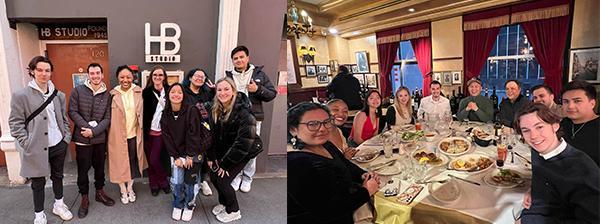 Left (l-r): Christian Barnard ’26 (Political Science, Theatre Arts), Alex Jordan ’25 (Philosophy, Theatre Arts), Kennedy Dawson '25 (Theatre Arts), Genevieve Schmidt ’25 (Theatre Arts), Dylan Caballero ’26 (Psychology, Child Studies), Caz Morales ’25 (Theatre Arts), Katie Castillo ’26 (Political Science, Theatre Arts), Gael Sotelo ’25 (Political Science, Theatre Arts). Photo by Jeff Bracco Jeffrey Bracco (Theatre and Dance) accompanied eight Theatre students to New York for Spring Break, where they took an acting masterclass in the Uta Hagen method at HB Studio; saw The Outsiders, Operation Mincemeat, Deep Blue Sound and Hell's Kitchen; volunteered with God's Love We Deliver preparing meals for community members in need; had dinner with BD Wong; and met up with alumni.
Here we are once again at the beginning of another spring quarter, full of promise and potential. With week 1 under our belts, we have much to look forward to over the next nine weeks. Spring is always packed with activity and this year we can expect nothing different. Early May brings one of our spring quarter’s most important milestones, when admitted students send in their deposits and our new first-year class begins to take shape. As you know, Santa Clara received a record number of applications this year and decision notifications went out last month. Nearly 5,000 students have been accepted to the College of Arts and Sciences and are in the throes of deciding whether they will attend. Today, we have the first of several opportunities to welcome admitted students to Santa Clara. As part of DiscoverSCU, they will attend mock classes, listen to student panels, and take campus tours. It’s an excellent chance for participants to connect with the College and get to know what we are all about. We are also gearing up for Preview Day on Saturday, April 12. As the University’s largest event for admitted students, we are expecting nearly 2,000 attendees to join us on campus that day. Many of our departments have been hard at work planning informational talks and tours to showcase their programs. Success on this important day takes a great deal of preparation and creativity. I am grateful to everyone who is taking part—whether you are on the ground or behind the scenes. This week’s poem is in honor of this year’s Trans Day of Visibility, which happened this week (March 31st). The poem, by Rose Zinnia, was Poetry Foundation’s featured poem of the day yesterday (Thursday, April 3rd). Onward! Daniel I’m Like If Mary Oliver Had Attention Deficit Hyperactivity Disorder
By Rose Zinnia
i’m evolving from sadtrans to joytrans & g-d is my pokémon trainer i only expect i will have a final form by the circumstance of my being perishable when i enter a room my brain calculates how many ppl might be i am trying to let wonder & uncertainty dom me every day sometimes i’m feral napcore audhd hyporheic cloudleaf unmasked pilled tbh i’m not even trans i’m a sheaf of blessings that makes a soft noise when when we trace back our wound to root it becomes unwound it mutates into catch me divinizing the quotidian by becoming obsessed w this river- i fully expect a mycelial network to fall in love w me for some reason my/your face a coven of we a listening beyond the comprehensible it is not enough to love the earth i must merge my body w hers entirely i’m like if love were a kind of esoteric circle that exploded every six months looking back i’m jealous all my bullies insisted i was a girl before i did the word bad comes from the old English bæddel meaning hermaphrodite attention is the beginning of devotion is something mary oliver said my body being stored within the word bad is a form of devotion my attention is both deficient & hyperactive i.e. i am touchingfeeling devotion is the practice of belonging is something the earth cosplaying as me as a joytrans my special pokèmon moves are witness & surrender i think i am just trying to have a nice day most of the time but i am open to the coolest thing ab me is probably when you google my name you are met only w flowers Highlights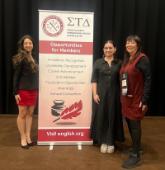
Sigma Tau Delta, the international English Honor Society for English undergraduate and graduate students, closed the year-long celebration of its 100th anniversary at its annual convention, held March 19-22 in Pittsburgh, Pennsylvania. Kamyllie Arteaga-Gutierrez ’25 (English, Philosophy) and Megan Milligan ’25 (English) attended the convention to present their papers. They were accompanied by Simone J. Billings, Department of English Emerita and a co-moderator of the SCU chapter since its inception. Simone also moderated a few sessions at the convention. Kamyllie presented a paper of literary analysis—“Truth that Liberates but Burdens: Cautions from ‘The Yellow Wallpaper’”; Megan presented a flash fiction piece—“Rings.” The three attended each other’s as well as other sessions on Creative Nonfiction and literary analysis. They also made time to visit the Andy Warhol Museum and take the commuter funicular up to the top of a hill to get a view of Pittsburgh’s myriad bridges and overall cityscape. The students are grateful for financial support from the Dean’s Office and from the Department of English that funded their trip. Image (l-r): Kamyllie Arteaga-Gutierrez, Megan Milligan, and Simone Billings by a banner at the Awards Ceremony of the 2025 Sigma Tau Delta convention.
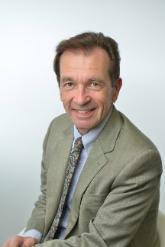
Tom Plante (Psychology) published the article "Ethics Corner: Ethical considerations working with LGBTQI+ clients" in the March 2025 issue of On Board with Professional Psychology. Abstract: Recent years have seen a surge in the need for LGBTQI+ health services. Advocacy for the LGBTQI+ community has been met with significant push back from some political voices across the country. Sadly, political and advocacy group agendas and desires can get in the way of quality evidence-based clinical practice when science takes a back seat to politics and advocacy. Clinical psychology health specialists, trying to do their very best to provide high-quality evidence-based best practices, can be challenged to do so in rapidly changing and politically polarizing times. Ethical conflicts often arise too. The American Psychological Association Code of Ethics can be helpful to organize and center our thinking to best assist LGBTQI+ clients and their families. This article highlights the ethical principles of informed consent (Section 10.01), beneficence (Principle A), respect (Principle E), and the boundaries of competence (Section 2.01) of the Code with recommendations for professional clinical practice.
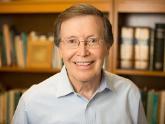
Francisco Jiménez (Modern Languages and Literatures Emeritus) has earned recognition for his book The Circuit Graphic Novel, which was named one of the Top Ten Graphic Novels for 2024 by the American Library Association. The Castro Valley Library also selected it for its annual Castro Valley Reads program (children’s category), running from Feb. 1 to April 11. In connection with the program, Francisco gave a talk at the library about the inspiration behind his book and his motivations for writing it. Additionally, on March 13, he delivered an in-person presentation followed by a Q&A session at Santa Clara University for 60 Puente Project students and their teachers from Bret Harte Middle School in Hayward.
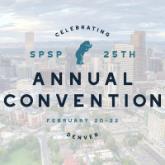
Kieran Sullivan (Psychology) presented a poster titled "Rejection Mindset in Online Dating" during the 2025 Annual Convention of the Society for Personality and Social Psychology in Denver, Colorado. The purpose of the study was to test rejection mindset—the tendency to be less satisfied with choices as the number of choices increases—in online dating using an experimental design. Before the experiment, participants were told the experimenters were beta testing a new dating app and were asked to submit a profile with their picture and three fun facts. Upon arrival, participants were randomly assigned to either a six- or 20-profile condition. They rated their satisfaction with choices and were given an opportunity to message their "matches" using Discord. If no message was sent within five minutes, researcher confederates initiate a chat. Regardless of who initiated, the researchers continued to respond to messages for 15 minutes. Initial data suggest that, as hypothesized, participants who saw 20 profiles were significantly less likely to initiate a chat, compared to those in the six-profile condition. They also had significantly fewer exchanges and wrote significantly fewer lines.
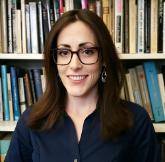
Susan Kennedy (Philosophy) co-authored a paper entitled "Materiality and Risk in the Age of Pervasive AI Sensors" in Nature Machine Intelligence. Artificial intelligence (AI) systems connected to sensor-laden devices are becoming pervasive, creating a greater need for accountability in their development and deployment. This article examines how the physical properties of sensors, along with the calculative models that govern their use, contribute to specific risks within wider AI systems. We propose a sensor-sensitive framework for assessing these risks, complementing existing approaches such as the U.S. National Institute of Standards and Technology AI Risk Management Framework and the European Union AI Act, and discuss its implementation. This framework fills a gap in AI ethics and governance discourse by bringing attention to often-overlooked stakeholders outside the immediate AI lifecycle, such as those involved in the design, manufacturing, and evaluation of sensors.
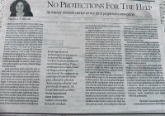
Sreela Sarkar (Communication) published an invited op-ed in The Indian Express, one of India's leading, national English-language daily newspapers. Her op-ed focused on the app-based gig economy and domestic workers in India. It argued that the gig economy and forms of emerging technologies promise inclusion for workers but reinforce and create new societal inequalities. Sreela's op-ed featured online on the "most read" list in The Indian Express. This piece was based on an academic article titled "How Crazy is Your Maid? Domestic Workers in the 'New' India" that was on the top five most read articles in Communication, Culture & Critique, which is the flagship journal of the International Communication Association (ICA).
Hsin-hung (Sean) Yeh (Modern Languages and Literatures) was invited by the Graduate Institute of Teaching Chinese as a Second Language at National Taiwan Normal University on Dec. 17, 2024, to present on curriculum design for less commonly taught languages, specifically Taiwanese (Tâi-gí). His talk focused on the development and implementation of UC Berkeley's first-ever Taiwanese language course, which he started to teach online in fall 2024. Through backward design and scaffolding strategies, students engaged in practical tasks such as interviewing native Taiwanese speakers, fostering both linguistic proficiency and organic connections with the Taiwanese-speaking community. He also demonstrated how to use digital learning tools, such as Canvas and Padlet, to enhance instruction for less commonly taught languages.
Nancy C. Unger (History) presented “Lessons From the Gilded Age: What Can Be Applied Today?” to the United States Capitol Historical Society. This highly illustrated talk demonstrates that there are a surprising number of instructive similarities between the long Gilded Age and Progressive Era (1877-1920) and our own. These range from businessmen who claimed that their wealth and acumen entitled them to enormous political power, to debates about controversial actions affecting the public including civil service reform, immigration, sexuality, race, women, and vaccines and public health. It concludes with a reminder of the importance and power of civic engagement.
|
| College of Arts and Sciences |
Questions? Contact Sandy Boyer |
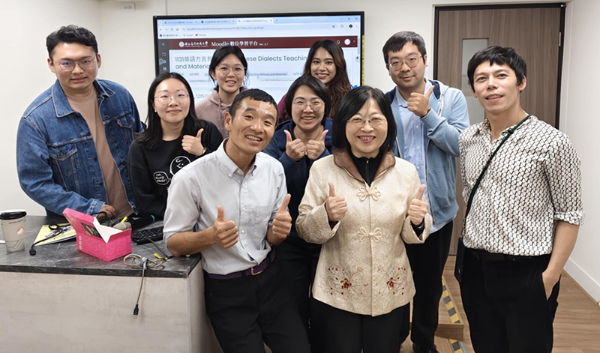 Hsin-hung (Sean) Yeh (front, left) with colleagues.
Hsin-hung (Sean) Yeh (front, left) with colleagues.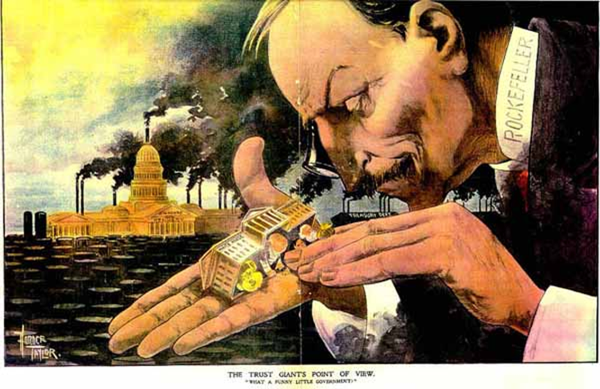 Wealthy businessmen who think of the U.S. Government as an amusing plaything are nothing new. Here John D. Rockefeller holds the White House in his hand in 1900, saying "What a funny little government."
Wealthy businessmen who think of the U.S. Government as an amusing plaything are nothing new. Here John D. Rockefeller holds the White House in his hand in 1900, saying "What a funny little government."